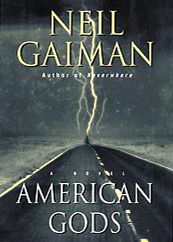Notes: American Gods

As you can see, I've just finished American Gods. It was entertaining, but it never became more than a laundry day book for me, even when I was salivating over the latest obscure reference or clever twist. I think it's because it frayed very easily at the edges, story-wise. Gaiman lays down some serious world-building rules in the first half of the book that he ultimately violates or ignores by the second half.
The story centers around Shadow, a sort of lost spiritual everyman, fresh out of prison, as he is thrust into a deeply chaotic battle between the old gods of centuries past (Odin, Horus, Coyote, etc.) and the new gods of the modern age (Media, Town, Stone, err... World... fat Internet kid.... huh?). The problem with the set up is that he seems to set some very firm guidelines for how the old gods behave in the modern age, but he takes a mulligan on the actual modern gods. Some are distinct, some are vague, some have minions, some don't. It's very hard to pin down exactly what they represent or why they exist. And Gaiman really dodges the whole Christ thing. One passing reference to how easy that kid had it and a handful of swears and that's about it. No recognizable Buddhism either.
So the story flies apart near the end in a very unsatisfying way. Certain revelations about the nature of the plot and universe are easily anticipated, and therefore less interesting, while others are tangental to the plot and therefore confusing. Ultimately we end on an awkward rising action that reveals more and more fantastic things until they stop being fantastic and become boring. I wish Gaiman had stopped writing around page 484. You know, when the main character SPOILER SPOILER SPOILER dies. There are 104 pages after that and they really don't add much. Kinda like the last fifteen minutes of the Hulk when Bruce Banner fights the lake.
Wow, I just remembered that Shadow actually has a scene like that in the last chapter. Weird.
The worst part is, the book made me think about death in a very personal, philosophical way, and now I can't stop contmplating the great beyond. It's not fun. Damn your thoughtful esoteric heart, Neil Gaiman!
So anyway. Tasty treat if you like that sort of thing. Good sugar rush. Lots of brushing and excercise required afterwards.
1 comment:
Maybe I will read this post-graduation when I will be able to read for fun (and profit?) again.
Post a Comment